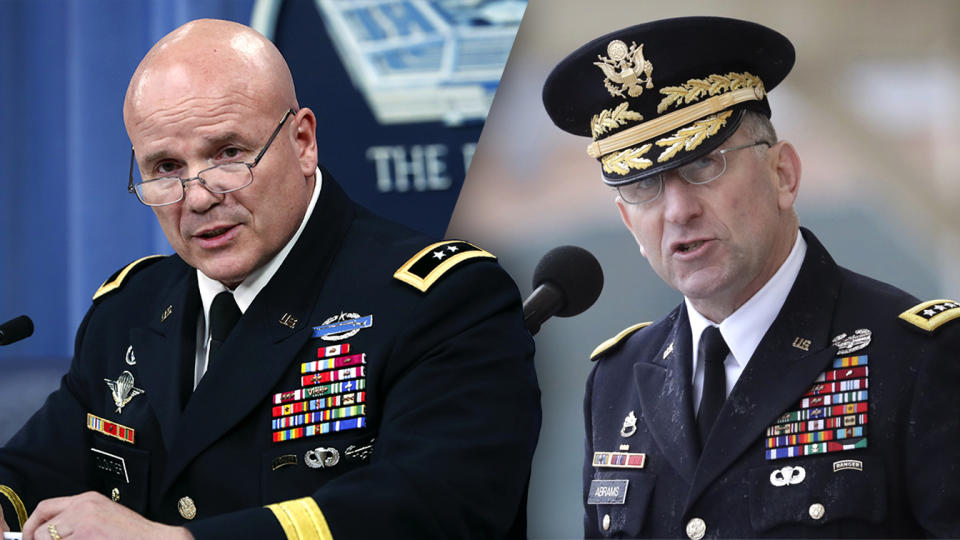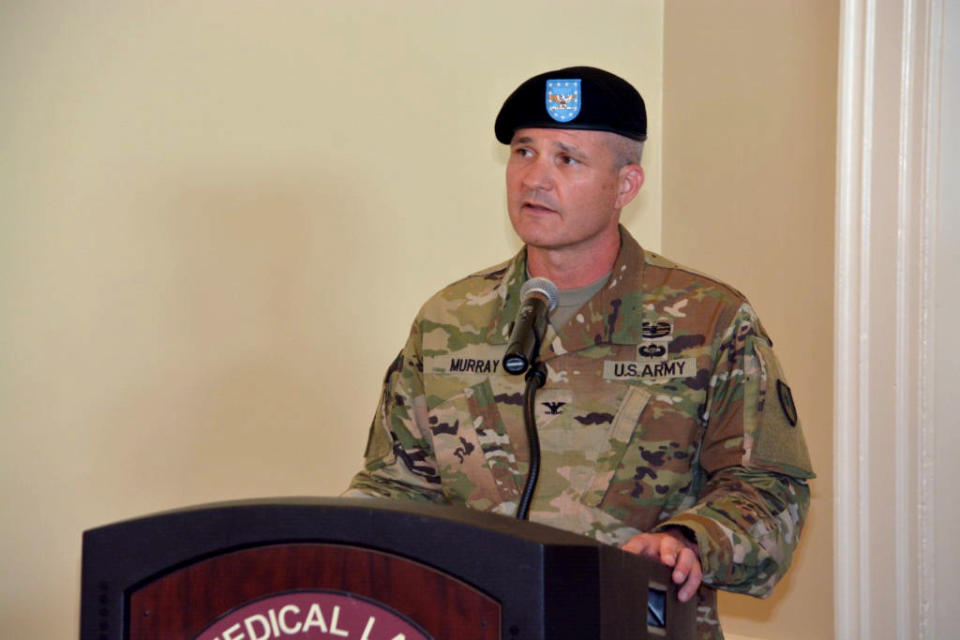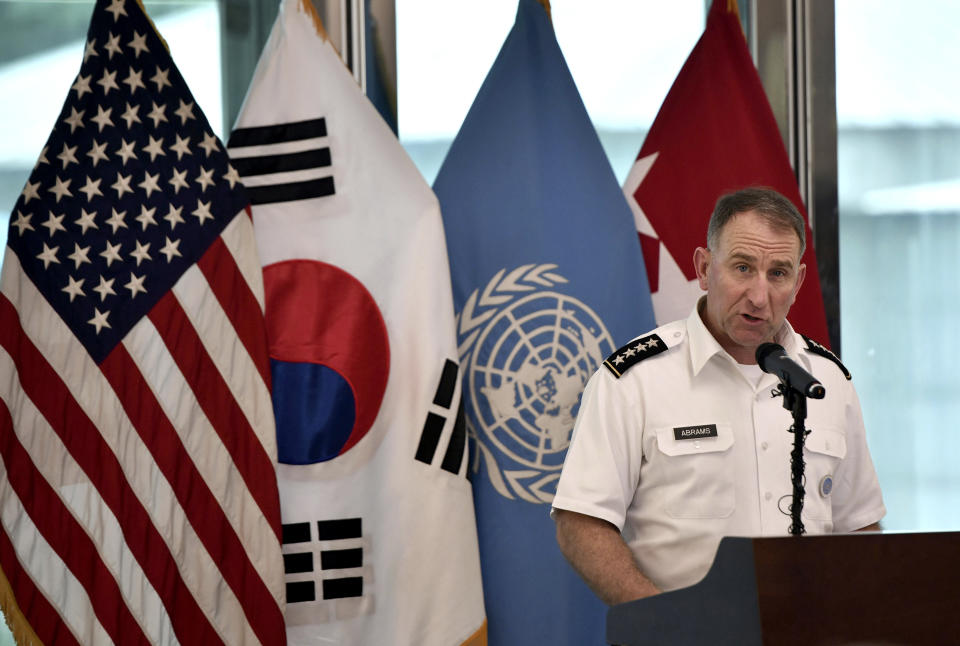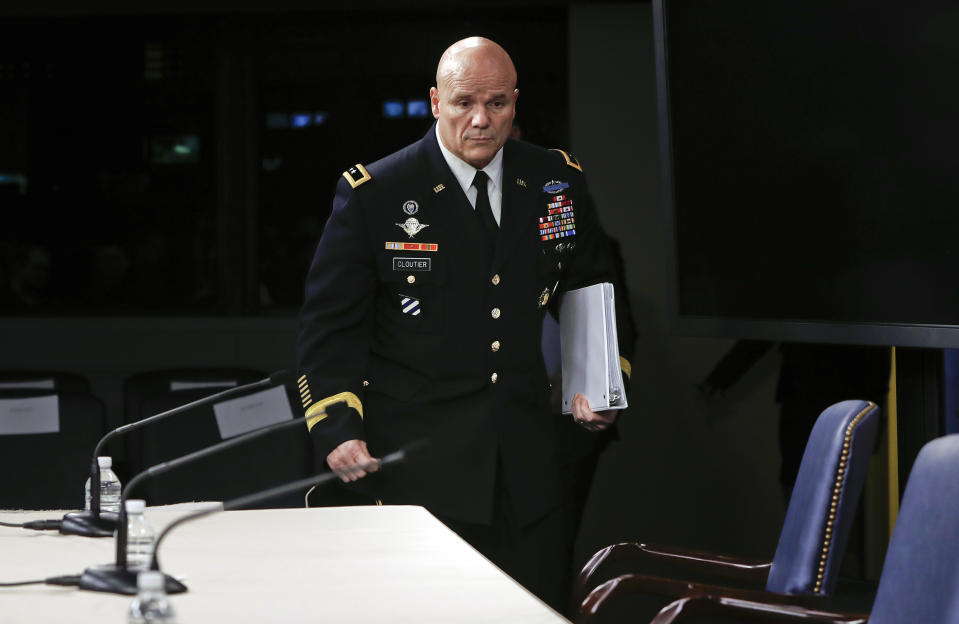'Protective bubbles': How 2 Army generals stopped the spread of coronavirus among their soldiers
When the senior U.S. Army officer in Italy ordered the gyms on Army installations in Vicenza closed starting Feb. 24, it wasn’t a popular decision.
One particularly upset fitness fanatic went to the trouble of writing “OPEN THE GYM” several hundred times in the comments section of an anonymous customer feedback site, two days in a row.
At the time, there were no reported coronavirus cases in Vicenza, a town of about 112,000 roughly 255 miles north of Rome, and only about 200 in the whole of Italy. None of the cases were from the U.S. Army community, which includes about 4,000 soldiers, 2,750 Army civilians and 8,750 dependents, split between Vicenza and Camp Darby, about 140 miles away to the southwest near Pisa. And that was how Maj. Gen. Roger Cloutier wanted to keep it when he shut down the gyms, as well as on-post schools, child development centers and churches that served both locations.
A 55-year-old infantry officer, Cloutier is formally the commander of U.S. Army Africa, but his headquarters’ location in Vicenza makes him what the Defense Department calls the “senior responsible officer” for U.S. Army forces in Italy, meaning he has administrative control over all U.S. soldiers in the country, even though most of them belong to U.S. Army Europe, which is headquartered in Germany, for operational purposes.
Cloutier is one of two generals that Army Secretary Ryan McCarthy and Army Chief of Staff Gen. James McConville have highlighted repeatedly in recent press conferences as examples of military leaders who have excelled in keeping their forces largely safe from the coronavirus. The other is Gen. Robert “Abe” Abrams, who commands all U.S. forces in South Korea.
Their success is a bright spot for a Pentagon now facing a torrent of criticism over the firing of a captain of a U.S. aircraft carrier stricken by the coronavirus. Acting Navy Secretary Thomas Modly said Thursday he was removing Capt. Brett Crozier for “extremely poor judgment” in cc’ing too many people when he sent a letter up his chain of command detailing his concerns about how the Navy was handling his crew’s health crisis.

After originating in late 2019 in China, the virus was first reported in South Korea on Jan. 20. The country appeared to have the outbreak under control until a 61-year-old woman became a so-called “superspreader,” infecting hundreds of people, largely via her church in Daegu, a city that is home to 2.5 million people and four U.S. Army installations about 147 miles southeast of Seoul.
By Feb. 20, more than half of South Korea’s 104 confirmed cases were in Daegu. The virus was “literally at our doorsteps,” Abrams told Pentagon reporters March 13. The four-star general took immediate action to protect the roughly 28,500 U.S. military personnel under his command and their dependents. Among other measures, he canceled all meetings, formations and training events for U.S. forces across the peninsula that involved more than 20 people. He also shut down school for military dependents in Daegu, allowed only “mission-essential” travel to the city for U.S. service members and requested more medical supplies.
Abrams had already taken several steps to get ahead of the outbreak: issuing the advice now familiar to most Americans about social distancing, washing hands and avoiding sick people; beefing up his headquarters so the staff could monitor the outbreak 24 hours a day; and imposing a 14-day quarantine on any member of the military community who’d been to China recently. “At our peak, we had 77 service members, family members and civilians in self-quarantine who had visited China,” he said.
As Abrams took these steps, he had a key advantage: his top medical officer, Army Col. Clinton Murray, who last summer began a one-year tour as U.S. Forces Korea surgeon. A command surgeon in the military can be any sort of doctor, Abrams noted, but “this year, by sheer luck, I happen to have one of the Army’s leading infectious disease doctors.”

Working closely with the Korean Centers for Disease Control and Prevention, Murray and his medical team came up with a set of metrics that allowed Abrams to be ready with a series of preprogrammed moves when certain conditions were met. Thus, when on Feb. 24 a 61-year-old widow in Daegu became the first U.S. military dependent to test positive for COVID-19, the disease caused by the coronavirus, Abrams was prepared.
He immediately raised the risk level to “high” for all U.S. forces in the country, limited base access to only those whose presence was “mission-essential,” instituted telework procedures and insisted that all those entering the bases be medically screened, which required filling out a questionnaire and having their temperatures taken. The number of people trying to come onto base dropped 60 percent, “which further reduced the potential spread” of the coronavirus to U.S. Forces Korea troops, Abrams said.
The general also shut down all Defense Department schooling for U.S. children on the peninsula and placed all bars, restaurants and movie theaters off-limits to U.S. Forces Korea personnel and their families. The new rules, which remain in place, mean U.S. Forces Korea personnel and their family members are allowed off base only to visit medical providers, grocery stores and pharmacies, as well as to travel to and from work. For those working on base, there are strict social distancing requirements, while all commonly used items and surfaces are repeatedly wiped down throughout the workday.
From the start, Murray noted in an email to Yahoo News, Abrams treated the spread of the coronavirus “like a combat operation” and adopted the social media-friendly mantra #KILLthevirus (which even made it into at least one of President Donald Trump’s tweets).
The aim, Abrams said, was to create “protective bubbles around our installations, just to keep the virus out of our formations, out of our workforce, out of our homes and out of our schools.” Abrams’s troops were also ready if any person associated with U.S. Forces Korea tested positive, with teams poised to immediately trace that individual’s contacts, place any potentially infected person in quarantine and thoroughly clean all locations the individual had visited in the previous 48 hours.

So far the steps appear to be working. On Feb. 25, a soldier stationed at Camp Carroll, just outside Daegu, became the first U.S. service member in South Korea to test positive (although as it can take up to two weeks for an infected individual to exhibit symptoms, that soldier almost certainly contracted the disease before the new measures went into effect). But in the five weeks since then, as the total number of cases in South Korea surged to almost 10,000, only one other U.S. service member in the country has tested positive, a testament to the effectiveness of Abrams’s measures when applied early and with rigor.
(About a dozen other individuals associated with the command — dependents, U.S. contractors, Defense Department civilians and local hires — have also tested positive. In almost all cases those people lived off base.)
No single measure has proved more important than any other in controlling the outbreak, according to Murray. “The entire package is required,” he wrote.
From his Vicenza headquarters 5,500 miles away, Cloutier was able to draw on Abrams’s lessons learned as he prepared to face the coronavirus onslaught.
On the day he closed down almost all public activities for U.S. soldiers in Italy, he put out a Facebook video message to his community in which he did not mince words. “The situation is not going to cure itself overnight,” he said in a Feb. 24 Facebook video message to the Army community in Italy. “In fact, it could get worse before it gets better.”
Cloutier said one factor behind his decision to shut so much down was that he was trying to stay in step with the local Italian authorities, who had also closed schools that day. But he also wanted to get ahead of the virus, and he had a plan for how to do that.
Cloutier’s spokesman, Col. Ryan Dillon, said his boss likes to say that combating the virus is like fighting a wildfire: “Dig the fire break, dig it early and dig it wide to stop the spread.”

Cloutier’s decision to close the gyms, theaters, churches and schools before there were any confirmed cases in Vicenza and relatively few in Italy was grounded in his belief that it is “better to act radically early,” Dillon said. Although “many in the community” initially questioned the need to shut activities down, “those decisions then put us in a strong position to plan and prepare how to further protect the force,” he said.
In the meantime, Italy, with a population of about 60 million, now leads the world in deaths from COVID-19, with almost 14,000 fatalities out of more than 115,000 cases as of Thursday, according to researchers at Johns Hopkins University. News stories of Italian doctors having to make wrenching decisions about which patients to try to save first have filled American readers with foreboding as the virus spreads across the United States.
Five and a half weeks after Cloutier acted to protect his community of 15,500 Americans, fewer than five of them have tested positive. None have died. By comparison, by March 27, the U.S. military community in Stuttgart, Germany, had at least 69 confirmed cases, including troops, Defense Department civilians, contractors and dependents, according to Stars and Stripes. (The Defense Department has since banned individual military organizations or headquarters from releasing numbers of confirmed cases.)
In neither Korea nor Italy are U.S. military officials ready to declare victory just yet. While South Korea appears to be past the worst of its coronavirus outbreak, the death toll in Italy continues to rise precipitously. Cloutier’s aim remains the same: to protect the force using “clear policy that is ruthlessly enforced … so that each subordinate command is not doing its own thing,” Dillon said.
And as for the gyms, which remain closed? “Nobody’s complaining about that now,” he said.
_____
Click here for the latest coronavirus news and updates. According to experts, people over 60 and those who are immunocompromised continue to be the most at risk. If you have questions, please reference the CDC and WHO’s resource guides.
Read more:

 Yahoo News
Yahoo News 


